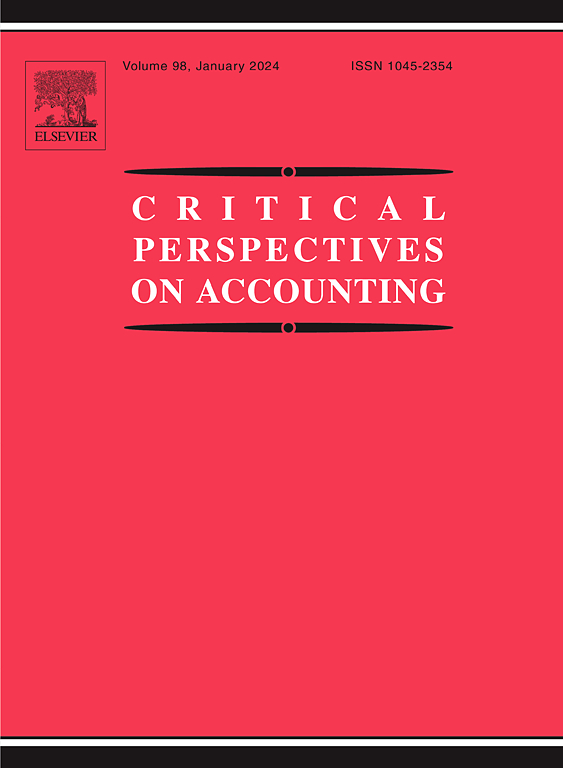Accountability and sovereignty: Financial controls in the Palestine-Israel Indigenous-settler relationship
IF 5.7
2区 管理学
Q1 BUSINESS, FINANCE
引用次数: 0
Abstract
This paper examines the intricate dynamics of accountability within the context of historical and political power imbalances in the Palestine-Israel relationship. It explores the paradoxical nature of accountability in settler-colonial contexts, focusing on why accountability mechanisms frequently fail to serve Indigenous populations. Using empirical illustrations of revenue-sharing mechanisms, the study reveals how the settler state—Israel—exerts control over tax revenues accrued to the Palestinian Authority (PA), arbitrarily deducting expenses without transparency or oversight. This lack of transparency leaves the PA uninformed about actual revenue figures and unable to scrutinise deductions, exacerbating power imbalances, weakening internal accountability mechanisms, and increasing vulnerability to corruption. The paper contributes to the growing body of research on accountability practices affecting Indigenous populations by examining their intersection with settler colonialism. It highlights how settler states prioritise their sovereignty to undermine accountability structures and marginalise Indigenous governance. Drawing on concepts such as “settler sovereignty” and “primitive accumulation,” the paper advances the literature on accounting’s role in dispossession, disempowerment, and systemic oppression. Furthermore, it underscores the pivotal role of financial control as a tool of settler-colonial domination, offering valuable insights into the broader implications of accountability within such frameworks.
问责制和主权:巴以土著定居者关系中的财政控制
本文考察了巴以关系中历史和政治权力失衡背景下问责制的复杂动态。它探讨了问责制在定居者-殖民地背景下的矛盾性质,重点是问责机制为什么经常不能为土著人口服务。通过对收入分享机制的实证说明,该研究揭示了定居者国家以色列如何对巴勒斯坦权力机构(PA)的税收收入施加控制,在没有透明度或监督的情况下任意扣除费用。缺乏透明度使得巴勒斯坦权力机构不了解实际的收入数字,也无法审查扣除,加剧了权力不平衡,削弱了内部问责机制,并增加了腐败的脆弱性。本文通过考察土著居民与定居者殖民主义的交集,对影响土著居民的问责做法的研究做出了贡献。它突出了移民国家如何优先考虑其主权,以破坏问责制结构并边缘化土著治理。利用“定居者主权”和“原始积累”等概念,本文推进了关于会计在剥夺、剥夺权力和系统性压迫中的作用的文献。此外,它强调了金融控制作为移民-殖民统治工具的关键作用,为在这种框架内问责制的更广泛影响提供了宝贵的见解。
本文章由计算机程序翻译,如有差异,请以英文原文为准。
求助全文
约1分钟内获得全文
求助全文
来源期刊

Critical Perspectives on Accounting
BUSINESS, FINANCE-
CiteScore
9.40
自引率
7.80%
发文量
91
期刊介绍:
Critical Perspectives on Accounting aims to provide a forum for the growing number of accounting researchers and practitioners who realize that conventional theory and practice is ill-suited to the challenges of the modern environment, and that accounting practices and corporate behavior are inextricably connected with many allocative, distributive, social, and ecological problems of our era. From such concerns, a new literature is emerging that seeks to reformulate corporate, social, and political activity, and the theoretical and practical means by which we apprehend and affect that activity. Research Areas Include: • Studies involving the political economy of accounting, critical accounting, radical accounting, and accounting''s implication in the exercise of power • Financial accounting''s role in the processes of international capital formation, including its impact on stock market stability and international banking activities • Management accounting''s role in organizing the labor process • The relationship between accounting and the state in various social formations • Studies of accounting''s historical role, as a means of "remembering" the subject''s social and conflictual character • The role of accounting in establishing "real" democracy at work and other domains of life • Accounting''s adjudicative function in international exchanges, such as that of the Third World debt • Antagonisms between the social and private character of accounting, such as conflicts of interest in the audit process • The identification of new constituencies for radical and critical accounting information • Accounting''s involvement in gender and class conflicts in the workplace • The interplay between accounting, social conflict, industrialization, bureaucracy, and technocracy • Reappraisals of the role of accounting as a science and technology • Critical reviews of "useful" scientific knowledge about organizations
 求助内容:
求助内容: 应助结果提醒方式:
应助结果提醒方式:


